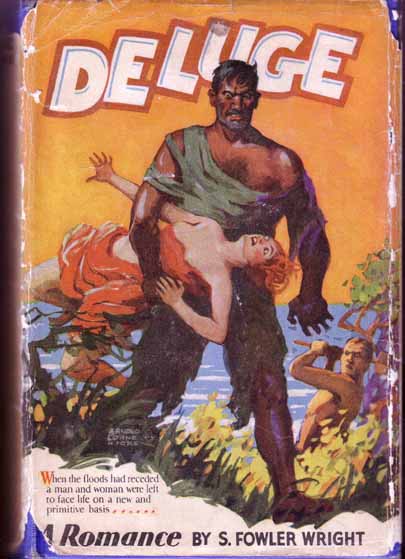In some ways, Noah’s flood could qualify as a cozy catastrophe — made all the more cozy by divine revelation informing Noah of the impending disaster and telling him how best to survive it. However, I don’t know anyone who classifies the story as one.
On the other hand, God deigned not to intervene in S. Fowler Wright’s 1928 novel Deluge and it is an excellent example of the cozy catastrophe.
We’ve already observed that the cozy is not a recent phenomenon as some would suggest. It goes as far back as 1885 with Richard Jefferies’ After London; or, Wild England. And perhaps further. Especially if we include Noah.
Wright is a new author to me. He was very popular in his day. Unfortunately, he is faded into oblivion. There is a website dedicated to him — www.sfw.org — which includes nearly all of his works.
I was very impressed with Deluge and am currently reading the sequel, Dawn. The characters are well-drawn and believable, at least believable given the standards of 1928. Which means there is a definite class structure as well as a definite sexual divide between men and women, something some modern readers might have trouble with. However, Wright includes strong leaders among the lower class and includes two very strong female leads, which shows Wright to have been an author ahead of his time.
The novel is a wonderful blend of survival, love triangle, and nascent future building. Wright knew how to keep the tension mounting. His hero and heroines don’t have an easy time of it.
If the novel has any flaws it is that Wright tells the story in the third person omniscient. We learn everything about everything, which at times I felt bogged down the story with information I didn’t think necessary or that could have been given to me through some other form, such as conversation.
Engaging in descriptions of sex was taboo back then and I found amusing some of Wright’s circumlocutions to get around the subject and say what couldn’t be said. One involves one of the character’s claim she could be pregnant. Having only been with the man for five days and not intimate for most of those days makes pregnancy unlikely. However, Wright couldn’t come right out with the couple engaging in sex. So he uses the euphemism of pregnancy to tell the reader they were indeed getting it on!
Aside from the third person omniscient point of view and subject taboos we might find resulting in odd circumlocutions and euphemisms, the book is eminently readable.
The story tells us first of Martin and Helen, husband and wife, who get separated by the overnight catastrophe, and of Martin’s subsequent attempts to survive. The story then shifts to Claire, her survival, and her eventual meeting up with Martin. And because writers must make their characters suffer… Well, Gentle Reader, I’ll leave it there. You will need to read this tale to find out how it ends. The ending, I will say, is a satisfying surprise.
The cozy catastrophe is alive and well. There are many wonderful examples out there waiting to be discovered. Examples of human courage, hope, and ingenuity. For me, that is what makes the cozy catastrophe so enjoyable. It gives me hope the good within us all will win out over the evil.
Comments are always welcome. Until next time, happy reading!
Share This!

